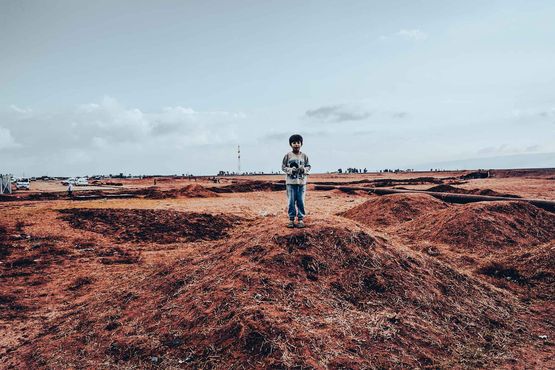Decalogue of this war

© 2023 FdR
Ten thoughts not to lose our compass in the face of the war we are witnessing in the Middle East. To meet the demands of our readers, there is the FdR Decalogue.
1. On 7 October, Hamas penetrated Israel killing more than a thousand people, the vast majority of whom were civilians. It is impossible that Hamas did not imagine Israel's reaction. However, Hamas has been very careful not to prepare the Gaza Strip's emergency and medical services, which today claim to be running out of (if not out of) fuel for hospital generators, medical supplies and more.
2. Israel has declared war on Hamas (not the first time), but the pictures tell (not the first time) a different story: Palestinian civilians pay the price. Does it matter to anyone, anywhere?
3. Palestinian civilian casualties do not matter to Hamas: instead, it considers them a necessary sacrifice to its 'cause' and a tool of parallel warfare, the one fought on the media and social media.
4. The majority of the Israeli population no longer trusts Prime Minister Benjamin Netanyahu, and indeed intends to send him home for good, if not to court, at the end of this war (poll). They hold him and his government responsible for failing to quickly foresee and counter the massacre carried out by Hamas on 7 October. However, Israelis trust Netanyahu with the military response Israel is giving to the Hamas attack. What makes them believe that the prime minister is not tragically wrong again?
The question is legitimate the moment the West asks: why haven't the Palestinians sent Hamas home? And this for quite some time?
5. Do Arab societies believe everything? It is not yet clear (it never will be) who caused the explosion at the Al-Ahli al-Arabi hospital in Gaza. Israel accuses Islamic Jihad. Islamic Jihad accuses Israel. Ramallah, in the West Bank, and the squares of many Arab countries were set on fire: the search for truth in war does not matter. What matters is the version we choose to believe. The bombing of Gaza should be enough, along with the 7 October massacre, to push everyone to demand an end to the violence. But it doesn't.
6. Israeli Prime Minister Benjamin Netanyahu repeats at every opportunity that Israel's reaction to 7 October is 'a civilisation war' that affects us all. In this way, he intends to link Israel's reaction not only to that of the West and the US after 9/11 and subsequently against the Islamic State, but more generally to shared values. US President Joe Biden yesterday urged Netanyahu not to make the same mistakes that the US (and its allies) made after 9/11. Europe is shattered and, therefore, mute.
7. The exacerbation of values in the clash of Good against Evil, in the clash between civilisation and obscurantism is a trap: it pushes us to suspend the use of critical reason and, at the same time, to neglect or forget History, not to say the chronicle. History (or historiography) and, along with it, journalistic dispatches do not justify, but explain, illustrate, or at least try to. To forget History, chronicle and dispatches accumulated over the years from that land, to do so on the wave of the understandable emotion aroused by the crimes committed by Hamas on 7 October, would condemn us to a navigation of reality devoid of reasoning. The same goes for those who, bending History this time in their own way, force it to justify the massacre committed by Hamas.
We are witnessing an attempt to impose, on opposite sides, a hybrid reading of reality, of History and of the chronicle, through an unpromising and generalising psychologisation of it.
8. In the many years I have spent living day after day in that land, I have witnessed countless Palestinian attacks against the Israeli civilian population (suicide attacks, etc.). I have, however, also seen and recounted countless (countless!) Palestinian civilian victims (many children and young people, dead or reduced to a vegetative state) caused, in the West Bank and Gaza, by Israeli soldiers, sometimes even by so-called settlers. I refrain, out of pity for the dead, from putting them in the scales.
9. The Hamas attacks against Israel on 7 October were aimed at exactly that: to condemn us to reason with our bellies and not our heads. Israel's reaction against Gaza has the same objective. It is difficult to write, it is perhaps even risky, but it is so. When we reason with our belly, we forget History and the chronicle, within which only we can identify the wrongs and the reasons of each other. Reasons and wrongs that belong to each other. Only in this way could we, as Westerners, really help the people of Israel and the Palestinian people to get out of the trap in which they find themselves.
10. The Israelis demand revenge for their dead and security for the future. They ignore, however, that the more civilian deaths in Gaza and the West Bank that Israel causes, the more Palestinians will rise to justify Hamas' action on 7 October. When (and if) Israel can say that it has eliminated Hamas from the Gaza Strip, it will find that it will have cemented it in the minds of Palestinians, no doubt also in the minds of many who have hitherto stubbornly opposed it. There will be no one else left for them to turn to, to think about. Is this what we want?
Extra Decalogue thought: Every war (and the one we are witnessing is no exception, including the Hamas attack of 7. 10) aims to take away our freedom to ask questions.
Our freedom, even and especially in the face of horror, depends on the questions we still dare to ask. The day we stop, we will no longer be free.
(gianluca grossi)




